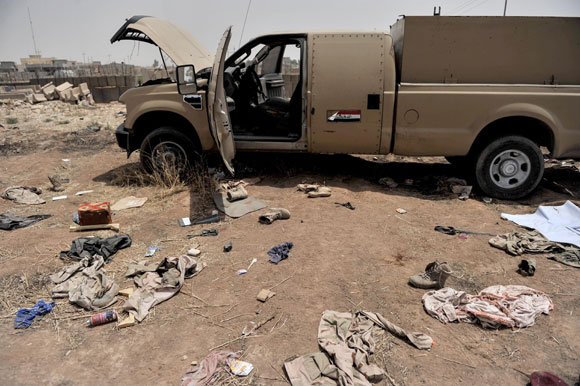No Good Alternatives
Duke faculty on the crisis in Iraq and whether it will spread

Militants of Islamic State of Iraq and the Levant damage the patrol car of Iraq army on the outskirts of Mosul, Iraq, on June 12. Members of the Iraqi army discarded their military clothes and fled the town. (Photo by Onur Coban/Anadolu Agency/Getty Images)
The apparent collapse of the Iraqi government in the northern part of the country is doing more than bringing another Middle East country into crisis. This time the crisis has analysts wondering whether the region's boundaries, which have remained stable since World War I, are about to be redrawn.
Duke faculty say there aren't many good options for President Barack Obama.
Retired US Air Force major general and Duke Law professor Charlie Dunlap Jr., who directs Duke's Center on Law, Ethics and National Security and was former deputy judge advocate general of the U.S. Air Force, said even with U.S. help, it's unlikely the Maliki government will be able to regain the lost areas anytime soon.
"It will be all they can do to hold on to Baghdad and the Shiite regions to the south.
"Vice President Biden's much-disparaged proposal for a federated Iraq assembled from regions divided along Sunni, Shiite and Kurdish lines might need to be dusted off as it may be the best we can realistically hope for at this point, but even that is a long shot for several reasons, most of all because a Sunni entity dominated by ISIS (Islamic State in Iraq and Syria) would be -- and should be -- unacceptable."
"This is another international crisis where the Obama administration has no good alternatives."
Bruce Jentleson, professor of public policy and political science, gave a similar grim analysis to interviewer Tommy Tucker on WWL radio in New Orleans. Jentleson warns that any return to military action may not solve the underlying political problems brought on by the Maliki government's inability to reach out to Iraq's Sunni minority.
"We've spent years fighting a war there (Iraq), twice as long as WWII and almost four times as long as WWI, spent billions of dollars, a lot of brave Americans gave their lives and fundamentally the government in Iraq under the Shia government of Prime Minister Maliki has continued to alienate the people. You even have some of the Sunnis saying they'd rather go with the militants than the government and that's a pretty stark comparison that you're hearing from people on the ground.
"The Kurds right now are holding their own. They have a military that goes back to the early 1990s, and not just the US but UN forces helped train them. And they know what they're fighting for, whereas the military under Maliki, even the Shia, have shown up to work in their uniforms with their civilian clothes underneath and they're peeling off their uniforms rather than taking up the fight. And some people are blaming president Obama. We spent eight years trying to train these guys and if they don't want it, like anything else, you can't make people want it just by forcing it on them."
Jentleson told Tucker the famed surge of military strength in Iraq nearly a decade ago was meant to provide Iraq with the time to create political unity. It hasn't lasted, and he pointed the finger at Maliki.
"If we'd stayed another five years in Iraq, I think we'd have the same kind of problem, the political problem. The government was supposed to reach out to the Sunnis. What the surge accomplished for a little while was working with the Sunnis and the promise from Maliki was to work with these folks, give them jobs, a part of the pie proportional to the percentage of the population. He never did. And the fact they used our being there was a cover to not have to do what they needed to do for themselves."
Listen to Jentleson's full interview below.
"